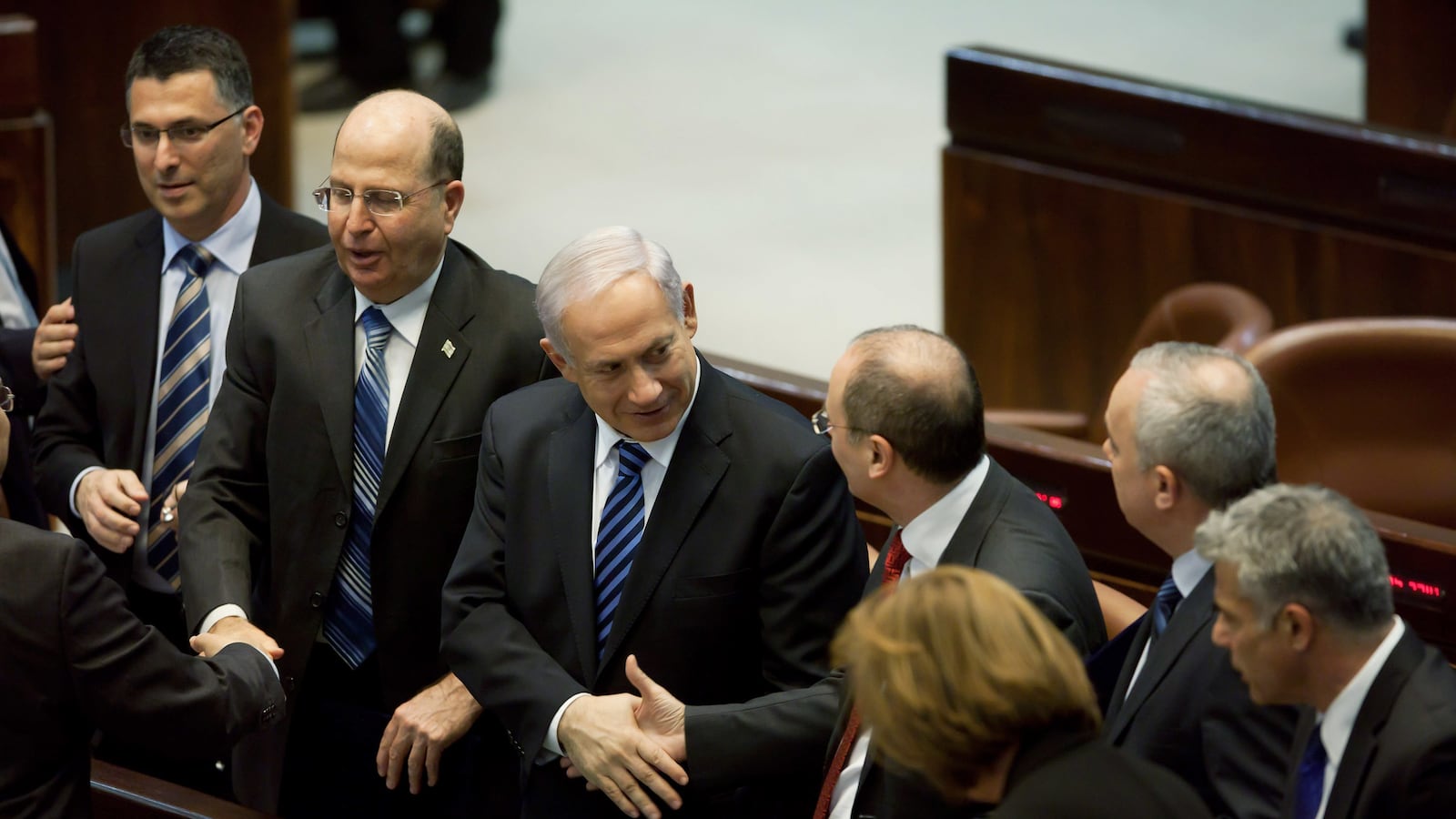If Israeli Prime Minister Netanyahu presses forward with the peace negotiations in a meaningful fashion, he will face a genuine coalition crisis. Netanyahu’s recent decision to release 104 Palestinian prisoners including those with “blood on their hands” infuriated his right-wing partners both inside his Likud party and in the larger coalition. With U.S. Secretary of State John Kerry announcing a nine-month timetable for reaching a final status accord with Palestinian President Mahmoud Abbas, tensions will only increase for Netanyahu. Although Netanyahu will probably lose support from the hawks in his coalition, he will likely gain backing from parties outside of the government, if he tangibly shows an interest in resolving the conflict.

Currently, Netanyahu has 68 Members of Knesset in his coalition—only seven more than the minimum majority of 61 MKs. It is true that until now Netanyahu has done an excellent job in retaining his coalition support, even from right-wing officials. Jerusalem Post’s Gil Hoffman suggests that this is due to his insistence that the negotiations be held in secrecy. Nonetheless, as the process continues Netanyahu will be forced to eventually reveal his concessions offered—a move that is likely to cause bitter opposition.
The first party to leave will probably be the ultra-nationalist Habayit Hayehudi with its 12 MKs. Its charismatic chairman, Naftali Bennett, has fervently rejected the establishment of a Palestinian state in the West Bank—no matter how small—and opposes any removal of Jewish settlements. Furthermore, a significant number of MKs in Netanyahu’s own Likud Party who agree with Bennett are likely to abandon the coalition.
However, meaningful progress in peace talks will not necessarily force the ouster of Netanyahu from his position. Chairwoman of the Labor Party, Shelly Yachimovich, announced this past weekend that she would be willing to join the coalition under the following three conditions: Habayit Hayehudi must leave the government; the cabinet must decide to begin evacuating isolated settlements; and an American “blueprint” must exist for a final status agreement. Although these conditions will not be easy for Netanyahu to endorse publicly, they are all essential for a permanent solution. With 15 MKs, Labor’s entrance into the government would provide strong support for Netanyahu and the peace process. It is interesting to note that former Prime Minister Ariel Sharon faced the same challenge; he recruited Labor in 2004 following his support for the controversial Gaza disengagement.
Meretz is another party likely to join the government to ensure that the coalition will not fall with an imminent peace agreement approaching. In a meeting with Prince Hassan bin Talal of Jordan, Meretz party chief Zahava Gal-On exclaimed, “Meretz may be in the opposition but (the party) will not be opposed to peace. Netanyahu doesn’t have a majority for a political settlement in his coalition, but he does have a majority in the Knesset.” Meretz’s 6 MKs would also play a critical role in sustaining Netanyahu’s coalition against attacks.
Finally, the ultra-Orthodox Shas party with 11 MKs is also another potential coalition partner for Netanyahu. Interestingly, during the Oslo period in the 1990’s, Shas, as a member of the ruling coalition, was essential in maintaining support for negotiations with the Palestinians. With a Palestinian flag flying in the Knesset, Shas MK Yitzchak Cohen participated in the historic meeting with a quarter of MKs and Palestinian legislators in a bid to show support for the peace process. Traditionally, one of the main issues for Shas has been bolstering financial support for religious institutions along with preserving a strong Jewish identity in Israel. If Netanyahu were to offer a substantial increase in payments to yeshivot or Jewish centers of learning, and possibly amend the proposal for increasing enlistment among ultra-Orthodox into the Israeli army, then Shas might be interested in joining such a coalition.
Netanyahu is taking a considerable risk in launching peace talks with Abbas. Yet if he backs out at this point, he will risk losing coalition support from Tzipi Livni’s Hatnua Party and left-wing Yesh Atid MKs, along with facing growing isolation from the international community. Still, showing continued progress on the diplomatic front will likely upset current coalition members, causing many of them to leave the government. However, with some creativity, Netanyahu will be able to press forward and reach an agreement—if he is truly interested.



